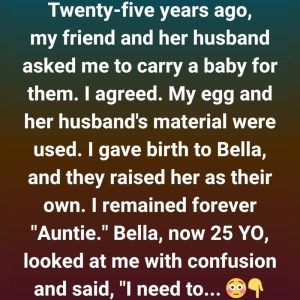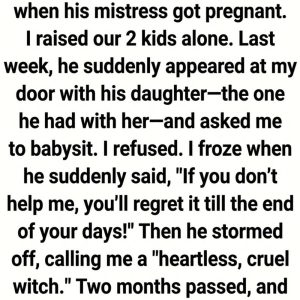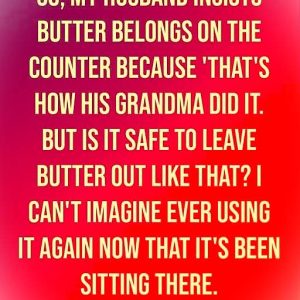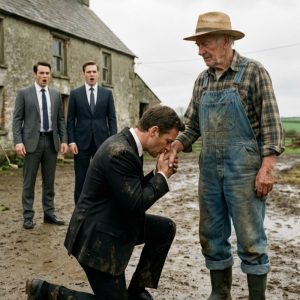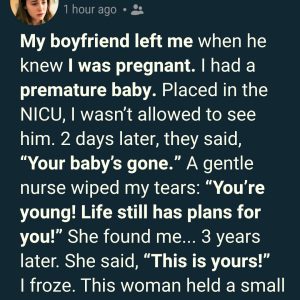When my world cracked open, it didn’t happen quietly. It shattered in a single terrible moment — the day my wife died giving birth to our son. The joy we had been waiting for, the baby we whispered prayers over for months, arrived too early and too small, fighting for every breath while my wife slipped away before I could even tell her he looked just like her. I remember stumbling down the hospital corridor, unable to think, unable to breathe, drowning in a grief so heavy it bent my spine. I pressed my hands to my face and felt everything inside me break. That was when an older nurse stopped beside me, placed her arms around my shoulders, and whispered, “Don’t give up. Your baby needs you.” Those six words didn’t erase the pain, but they anchored me, kept me from disappearing into the collapse. They were the reason I forced my feet back toward the NICU, night after night, trembling but determined.
Those early months blurred together like smudged ink. Days and nights looked the same — long stretches of worry broken only by the steady beeping of machines and the occasional gasp of relief. My son’s progress was measured in tiny increments. A stronger heart rhythm. A steadier respiration pattern. A day without alarms screaming through the room. Most fathers remember first smiles or first steps. I remember the first time a nurse said “stable” without hesitation. I remember the weight of fear that lived in my gut, a constant companion I didn’t know how to silence.
And through it all, this one nurse — the same woman who had caught me when I crumbled — stayed close. She wasn’t assigned to us every day, but she always seemed to appear when the anxiety grew sharpest. She explained every medical update with the patience of someone who understood how fragile courage can be. She talked me through treatment options, helped me decipher charts, and reassured me even when she couldn’t promise outcomes. She didn’t treat me like a burden or a clueless father fumbling through a crisis. She treated me like someone worth supporting. Without her, I would’ve lost myself in those endless weeks of uncertainty. In more ways than I ever admitted aloud, she kept me from falling apart.
Time eventually softened the edges of grief. My son grew stronger, then bigger, then wildly alive. He had my stubbornness and his mother’s eyes — deep, warm, wise. His laughter filled our house the way sunlight fills a room after a long winter. Even when the sadness hit in waves, his presence pulled me forward.
Years later, at a community event crowded with families and food trucks, I spotted her. Older, a little slower in her step, but unmistakably the same nurse whose kindness had held me up when everything else was collapsing. She noticed me before I could approach. Her face lit with recognition, and she hurried forward with the same warmth I remembered so vividly.
In her arms was a tiny baby. Fragile. Wide-eyed. The sight hit me like a memory. The child looked so much like my son had in those early days — delicate, small enough that the world seemed too big around him. She introduced the baby as her newest foster child. After retiring, she had opened her home to infants and toddlers who needed stability, love, and patience. Children caught in the cracks of complicated lives. Children who needed someone to believe in them first, before asking anything in return.
She told me she had fostered several already, each one arriving with a story far heavier than their size. She didn’t speak about it as a sacrifice or an act of heroism. She described it as something natural — something she was meant to do. That was the moment I understood that the kindness she had shown me years before wasn’t born out of a crisis. It was who she was at her core. Compassion wasn’t something she saved for dramatic moments. It was the way she moved through the world, steady and generous.
We talked about my son — how he was thriving, how he had started school, how he loved soccer and drawing dinosaurs. She laughed, saying she always knew he would grow into a fighter. She had seen it in him even when the machines had made him look too fragile to survive a breeze. And then she said something that caught me off guard: “I’m proud of you. You kept going. Not everyone does.” I didn’t know how to respond. No one had said that to me before.
Watching her cradle that foster baby, whispering soft words the way she once whispered hope to me, I felt everything — gratitude, awe, a quiet ache for the past, and a deep sense of clarity. Some people change your life in a single moment. Some do it without even realizing the scale of their impact. She was both.
I walked away from that event with my son’s small hand wrapped in mine, thinking about how she had helped him long before he ever took his first breath of steady air. Because if she hadn’t stopped in that hallway years ago — if she hadn’t placed her arms around me and told me not to give up — I’m not sure I would have had the strength to keep fighting. I’m not sure I could have been the father he needed.
Her kindness ripples through our lives even now. It lives in my son’s laughter. It lives in the choices I make as a parent. And it lives in every child she shelters, every little life she steadies with her quiet, unwavering compassion.
Some people leave legacies carved in stone or written into history books. Her legacy is different. It’s carried in the hearts of the people she’s helped survive their hardest days. People like me. People like the tiny baby in her arms.
I will never forget her. And I will never stop being grateful for the moment she lifted me up when I couldn’t stand on my own.
